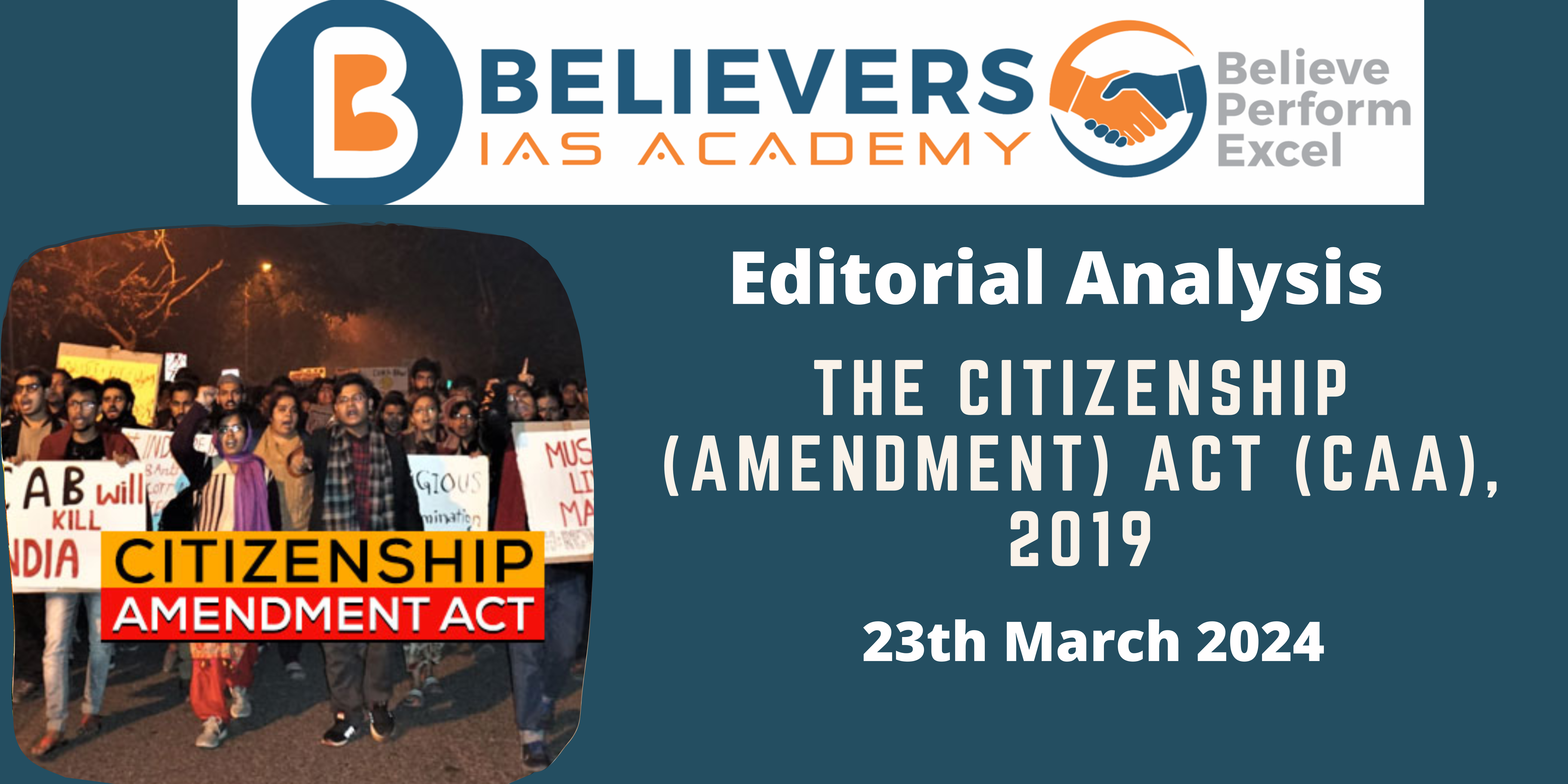The Citizenship (Amendment) Act (CAA), 2019
Context:
The government recently issued regulations for the Citizenship Amendment Act (CAA), 2019, marking the commencement of its enforcement more than 4 years after its approval by Parliament in December 2019.
Relevance:
GS-02 (Government policies and interventions)
Facts for prelims:
- United Nations Refugee Convention 1951:
- It defines who is a refugee and sets out the rights of individuals who are granted asylum and the responsibilities of nations that grant asylum.
- India is not a member.
- The NRC(National register of citizens) was published only once in 1951.
- There are two principles on which citizenship is granted:
- ‘jus soli’: On the basis of place of birth.
- ‘jus sanguinis’: On the basis of blood ties.
- Motilal Nehru Committee (1928): Was in favour of the enlightened concept of jus soli.
- Article 5: It provided for citizenship on commencement of the Constitution.
- Article 6: It provided rights of citizenship of certain persons who have migrated to India from Pakistan.
- Article 7: Provided Rights of citizenship of certain migrants to Pakistan but returned.
- Article 8: Provided Rights of citizenship of certain persons of Indian origin residing outside India.
- Article 9: Provided that if any person voluntarily acquired the citizenship of a foreign State will no longer be a citizen of India.
- Article10: It says that every person who is or is deemed to be a citizen of India under any of the foregoing provisions of this Part shall, subject to the provisions of any law that may be made by Parliament, continue to be such citizen.
- Article 11: It empowers Parliament to make any provision with respect to the acquisition and termination of citizenship and all matters relating to it.
Dimensions of the Article:
- About CAA
- Application Process and Documentation Requirements
- Mechanisms for Implementation
- Concerns and Challenges
About CAA:
- Citizenship Amendment Act (CAA) grants citizenship based on religion to six non-Muslim communities from neighbouring countries, namely Hindus, Sikhs, Buddhists, Jains, Parsis, and Christians, who arrived in India before December 31, 2014.
- Members of the six communities covered by the CAA are exempt from prosecution under the Foreigners Act, 1946, and the Passport Act, 1920, pertaining to illegal entry and overstaying visas.
- Concerns surrounding the Act: Critics argue that it may disproportionately benefit non-Muslims excluded from the National Register of Citizens (NRC), while Muslims could face challenges proving citizenship, particularly after the NRC implementation.
- In the North-East, the CAA’s implementation contradicts the Assam Accord of 1985, potentially impacting the region’s demographic composition and straining resources due to an estimated 20 million illegal Bangladeshi migrants in Assam.
- Critics argue that the CAA violates Article 14 of the Constitution, guaranteeing equality, and undermines secularism principles enshrined in the constitution’s preamble, as it discriminates against certain refugee groups not covered by the Act.
Application Process and Documentation Requirements:
- Applicants must prove their country of origin, religion, date of entry into India.
- They should have knowledge of an Indian language.
- Documentation requirements: Birth certificates, identity documents, and licenses, to establish country of origin and date of entry into India.
- This streamlined process aims to facilitate the acquisition of citizenship for eligible migrants.
Mechanisms for Implementation:
- The Ministry of Home Affairs (MHA) has entrusted the Postal department and Census officials with processing citizenship applications under the CAA.
- Central security agencies like the Intelligence Bureau (IB) will conduct background and security checks.
- Empowered committees, led by the Director (Census Operations) in each State, will make final decisions on applications.
- District-level committees, headed by the Superintendent of the Department of Post, will oversee the processing of applications, ensuring efficient implementation of the CAA.
Concerns and Challenges:
- Article 14: Critics argue that it violates Article 14 of the Indian Constitution by discriminating based on religion. Additionally, concerns about potential disenfranchisement arise from the CAA’s linkage to the National Register of Citizens (NRC), particularly in Assam.
- Compatibility with the Assam Accord, 1985: It could conflict with established criteria for citizenship in Assam. Moreover, the focus on religion as a criterion for citizenship eligibility raises broader concerns about its impact on secularism and social cohesion in India.
- Exclusion of certain religious communities: Such as Sri Lankan Tamils and Tibetan Buddhists highlights the need for a comprehensive reevaluation of the CAA’s provisions.
Way Forward and Conclusion:
- Addressing the issue requires a balanced approach that upholds constitutional principles. Hence, efforts should be made to ensure that the CAA does not undermine India’s secularism or perpetuate discrimination based on religion. The agenda must be prioritizing the protection of human rights and the promotion of social harmony.




